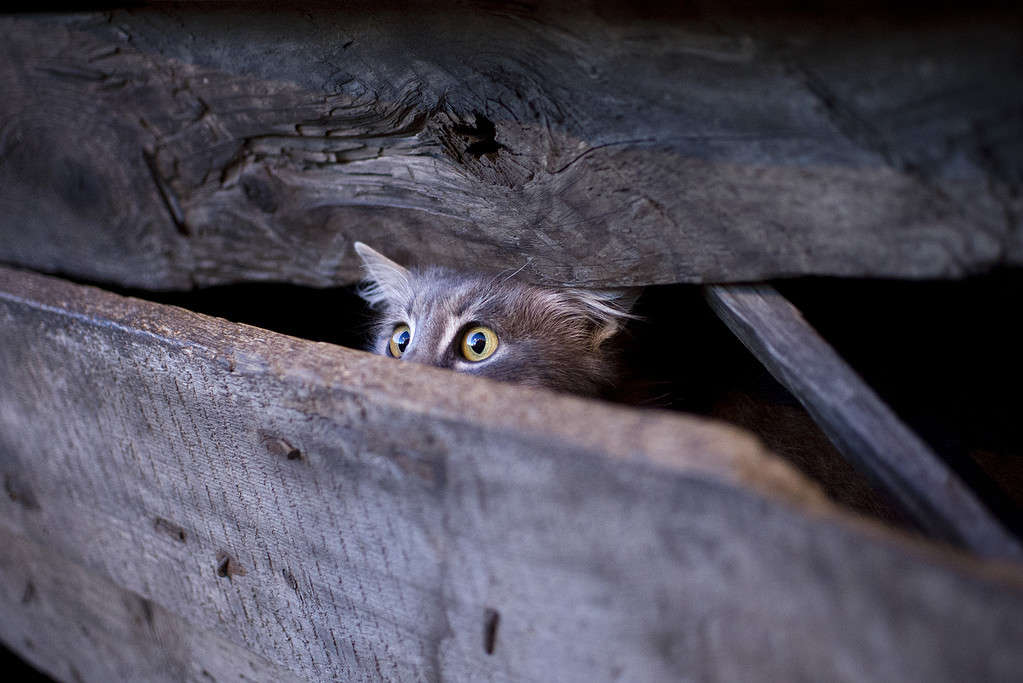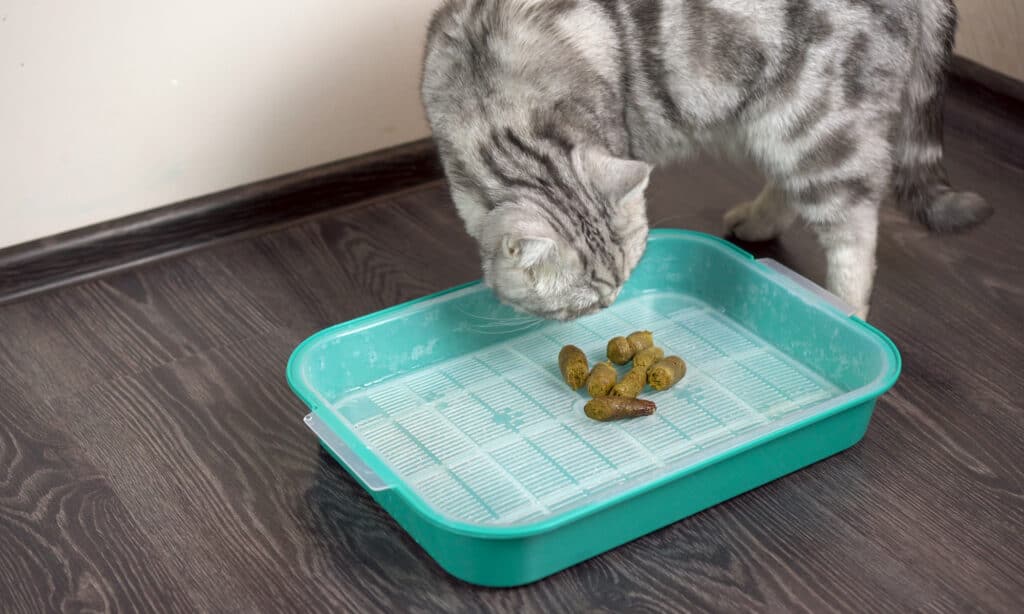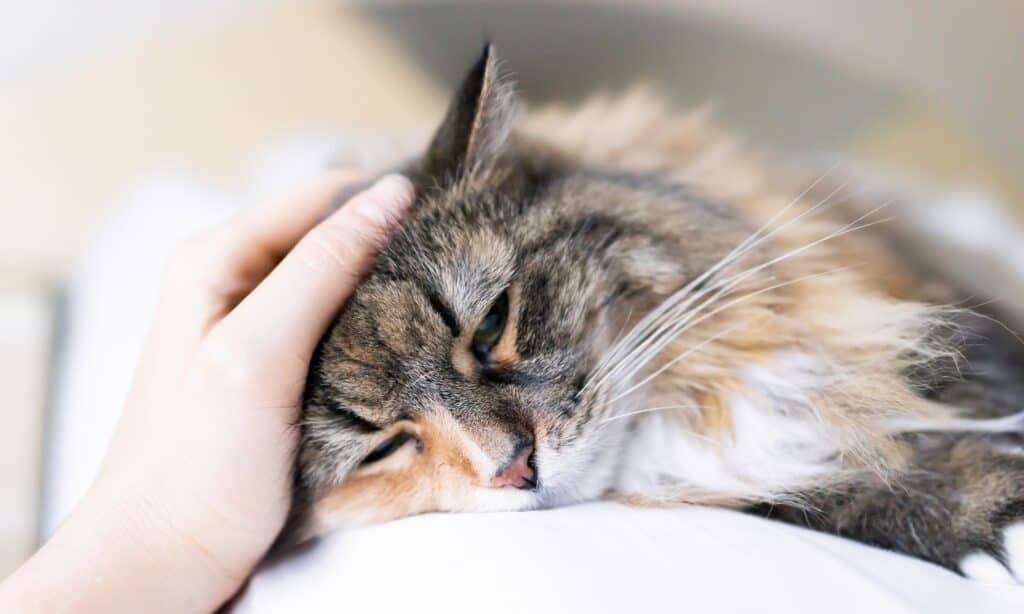Mother cats demonstrate the behavior of burying scat when their kittens are young, which sets them up to make this behavior a habit. They’re thorough with the process, sliding their paws over the litter to cover up their messes, thereby protecting them as they instruct them. But why do cats always bury their scat? Let’s find out! Plus, learn if you should worry if you notice your cat suddenly stops covering up their poops.
Why Do Cats Bury Their Scat?
There are several reasons why cats bury their scat. Often, it’s learned but it’s also instinctual. Outdoor feral cats exhibit a range of behaviors that tie to their natural instincts and domesticated indoor cats also exhibit these behaviors. However, they may not be as pronounced as a cat that has to face the realities of the wild.
To Avoid Predators
Although cats are definitely skilled predators when left out in the wild, crouching down and stealthily stalking their prey before pouncing to make a kill, they too fall into the food chain. As much as they focus on catching prey so they have enough sustenance to live, they also have to be careful about not getting caught by a predator. When cats venture outdoors, they have several predators that they have to evade like coyotes, snakes, and even dogs. To avoid them, they need to bury their poops so that they don’t leave a scent trail behind.

Outdoor cats have to be extra careful when roaming as the scent of their scat could alert other animals in the area of their presence.
©NikolaBarbutov/iStock via Getty Images
To Be Sneaky in New Territories
Outdoor cats venture into the territory of other cats. If they’re just walking through or they’re trying to check out the space, they need to do so sneakily. By burying their scat, they can move around without being detected by another, potentially territorial cat that may want to start a fight. If a cat were to just leave its poop out in the open, it would attract attention. That is not helpful for a cat in a new territory while it explores the environment.
To Help Them When Hunting
It’s not just predators or other cats in a territory that a roaming cat needs to be careful about. When a cat is hunting, it can make a mistake by leaving its scat uncovered and alerting other prey animals in the area that it is present. Cats employ stalking and ambushing behavior when hunting for prey and the scent of their scat is a dead giveaway. This prevents them from successfully executing a kill and getting their bellies filled for the day.
To Keep Up With Their Natural Inclination Toward Cleanliness
Cats are known for being clean creatures. They sometimes obsessively groom themselves to keep clean. After excreting waste, they focus on cleaning up not just their own bodies but also the area in which they defecated. When a cat buries its scat, it’s like a human flushing the toilet. They are doing their best to clean up after themselves, whether that means indoors after using the litterbox or outdoors.
To Keep From Revealing Vulnerabilities
When you smell cat poop, it just smells like poop. However, there are certain scents you can’t pick up on in cat scat that reveal whether a cat is sick or injured. When a cat buries its poop, it’s avoiding predators, yes. But it’s also ensuring that any of its own vulnerabilities aren’t being broadcasted to all of the wildlife in its surroundings. It’s a way to keep itself safe when it’s out in the wild. Interestingly, a domesticated cat that doesn’t bury its scat at home may be trying to tell you something.
Why Do Some Cats Not Bury Their Scat?

If your cat suddenly stops burying its scat, there’s some investigating to do.
©iStock.com/Vitalii Puzankov
It’s possible that a cat was never taught how to properly bury its scat. But for an indoor cat that went from tidying up post-poop to suddenly leaving the litter box without lifting a single paw, something may be up.
It’s Time to Clean the Litter Box
We’ve established that cats are clean creatures, and they expect a clean environment. They put forth the effort when they live indoors to cover up their poop after they use the litter box. However, if you’ve gone more than a day without cleaning up their waste, they may protest by leaving their poop uncovered. This is possible if you notice the behavior has changed. If they were previously covering up their poop and now they’re suddenly not, it could be that their litter box is too dirty and they’re letting you know. Sometimes, cats even poop just outside the litter box as a way to send a message.
Your Kitty Needs More Space
Your kitty may not be able to move around comfortably in their litter box. If you got them a litter box when they were younger, they may have already outgrown it, especially during their initial kitten to adulthood year. Therefore, take a look at the current litter box situation and determine if it might be too small for your cat. It should be at least 1.5 times the length of your cat so that they can move around inside of it comfortably. Some cats have a preference for an open litter box and may protest if they are forced to use a covered litter box. They need to feel safe enough to go but they may feel too cramped if the space is too tight. Simply replacing an old litter box with a larger litter box could solve this problem.
It’s Too Crowded in the Home
There’s no such thing as too many cats. However, if there are multiple cats in the home, there needs to be multiple litter boxes. The general rule is to have one extra litter box in the home for the number of cats you have. For instance, if you have two cats, you should have at least three litter boxes. In smaller apartments, this may not be feasible, but you should still have more than one if you have multiple cats in the home. This can help to clear up the issue of cats not covering their poop when they go potty. But again, this is only if you have noticed the behavior has changed. Some cats never learned to bury their scat and may have displayed this behavior since early kittenhood. If that’s the case, not burying it is normal behavior.
Your Cat Is Communicating Discomfort
Just like cats that bury their scat are trying to prevent communication with other animals in the area, when they suddenly stop burying their poops, they may be trying to communicate something to you. They might be injured, they might be ill, or they may be trying to send another message about their discomfort in the home. If your cat is older, they may be dealing with joint pain, which means it’s harder for them to get in and out of their litter box. Even covering their poop may be too painful of a movement for them. Additionally, medical issues that arise may not be evident to you right away, so your cat is letting you know that something is wrong.

Changes in cat behavior may mean that your kitty isn’t feeling well and needs a visit to the vet.
©iStock.com/krblokhin
The Litter Type May Need to Change
Sometimes, cats are persnickety about the type of litter you use. Cats are the types of creatures you spoil so if it’s a litter issue, you can switch over to something different. Maybe it’s a different smelling litter or it could be the texture of it that needs to change. You can try changing the litter box, or the litter, or adding an extra litter box. But if your cat continues to display the same behavior, it’s worth bringing it up to your veterinarian so they can do a full check-up to make sure your kitty is healthy.
The photo featured at the top of this post is © Natasha Zakharova/Shutterstock.com
Thank you for reading! Have some feedback for us? Contact the AZ Animals editorial team.






